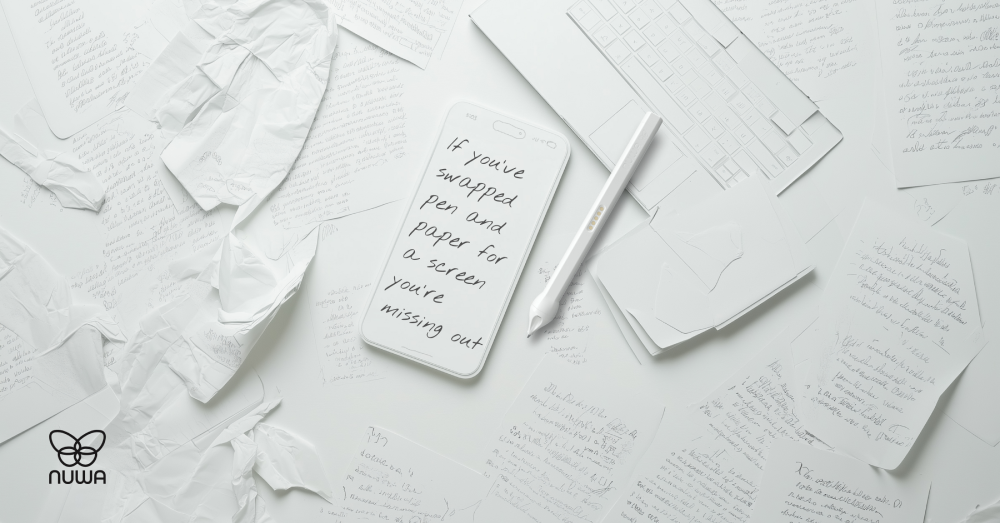A loading circle swirls as Zoom kicks into gear. Its operating system asks for permission to access the laptop camera and microphone. Accept. My notebook is resting on my lap, full of handwritten questions and diagrams. From thousands of miles away Ryder Carroll’s face appears on the screen. The wonders of 21st century technology have connected us to discuss the importance of handwriting.
Ryder is the founder of Bullet Journaling—a tool for managing a chaotic mind, a method for self-discovery, and ultimately, a way to design a more meaningful life.
Quieting the mind
Ryder’s journey with journaling began out of necessity. Growing up in the 90s with parents that taught at his school, he struggled to keep up with the strict demands of school life. “I had really bad ADHD, and most of the things that I was doing weren’t working—the way I was supposed to take notes, the way I was supposed to pay attention. None of that worked.”
In his search for tools to help manage his learning difficulties, Ryder stumbled upon various methods, some successful, others not. Over time, these tools began to form into what would eventually become the Bullet Journal method. But it wasn’t until much later that he realized the full potential of handwriting.
Self-Expression and analysis
Early experiences with journaling weren’t transformative for Ryder, there was no magical epiphany. Introduced to the practice by a middle school teacher, he was instructed to write about mundane aspects of his routine. “That context wasn’t interesting to me at all. It’s like, ‘Today I had a tuna fish sandwich for lunch,’” he says, reflecting on his first journaling experiences. At that point, it felt like a chore—something he did because he had to, not because it provided him any value.
It wasn’t until college that writing began to take on significance. Through creative writing classes, Ryder discovered that journaling could be more than just a record of daily events; it could be a powerful tool for self-expression. “Writing really became a form of expression for me, and then I realized that I could actually start to do the same thing about my life, start to express myself that way,” he explains. This realization marked a turning point in his relationship with journaling. No longer was it just about capturing data—it became a means of exploring and understanding his inner world.
Sharing the system
As Ryder continued to refine his journaling practice, he began to see it not only as a tool for self-expression, but as a system for organizing his life. The Bullet Journal method, as it’s known today, started to take shape around 2004-2006. “Once all the pieces started coming together, things started to move pretty fast,” he recalls. By this time, he had developed a reliable framework that helped him stay organized and productive, both personally and professionally.
But the true turning point came in 2013 when Ryder decided to share his system with others. “I decided to create a website to teach people how I use my notebook. And that’s when Bullet Journal truly was born,” he says. The method, which Ryder initially developed to manage his own chaotic mind, quickly resonated with others who were searching for a way to bring order to their lives.
Reflective OS
One of the key elements that sets Bullet Journaling apart from other journaling methods is its emphasis on reflection. Ryder explains that the method is designed not just to help you stay organized, but to help you become more aware of your thoughts, feelings, and actions. “It has created a framework that’s like an actual life OS [operating system],” he says. This system allows users to zoom in and out of their lives, identifying patterns and making intentional decisions based on those insights.
Ryder emphasizes the importance of this reflective aspect, noting how it has helped him personally. “If I didn’t write things down [by hand], I’d just forget them,” he admits. But beyond simple memory retention, journaling has allowed him to gain deeper insights into his own behavior. “I’ve been able to take a third-person view of my emotions, which is what good journaling should be. It gives you the ability to observe your own writing and then pull out of it what’s actually workable and what’s not.”
Who are you lying to?
In a world where much of our lives are lived online, Ryder sees journaling as a rare opportunity for private, authentic self-expression. “Journaling is one of the few activities left that isn’t performative,” he notes. Your journal is one place free of social pressures, curated narratives and judgment. Every blank page offers a space where we can be brutally honest with ourselves.
This authenticity, Ryder believes, is where the true power of journaling lies. “When you write things down, you externalize them, making it easier to process and take action,” he says. Whether it’s recognizing patterns in your life, working through difficult emotions, or simply organizing your thoughts, journaling provides a tangible way to engage with your inner world.
Continuous evolution
Since its public debut in 2013, Bullet Journaling has evolved, both for Ryder and the countless people who have adopted the method. Initially focused on productivity and organization, the method has increasingly become a tool for personal growth and self-awareness.
“The biggest shift for me was when I realized that the goal wasn’t just to be more focused and productive, but to understand why I was doing what I was doing.”
This realization has guided the ongoing development of the Bullet Journal method, which now incorporates practices for mindfulness and intentional living.
For Ryder, the journey of Bullet Journaling is far from over. He continues to refine and adapt the method, always looking for ways to make it more effective for himself and others. As he puts it, “Journaling creates this map of your life. If you do it diligently, you’ll find patterns, and those patterns will help you make better decisions and live a more intentional life.”
Ryder’s journey with handwriting and Bullet Journaling is a testament to the power of the written word. What began as a necessity—a way to manage the challenges of ADHD—evolved into a comprehensive system for self-expression, organization, and personal growth. It also adds anecdotal evidence to the mounting studies that tout handwriting as a magic tool for comprehension, memory, creativity and general mental health.
Through his experience, Ryder has shown that journaling is not just a tool for productivity; it’s a pathway to deeper self-awareness and intentional living. In an age that often feels chaotic and overwhelming, the simple act of putting pen to paper can be a powerful means of finding clarity and purpose.
Our conversation came to a close as we discussed the well-known balancing act between good writing and efficient writing. “There's a difference between expediency and efficiency, right? So it's much easier to write in Word processor or in your app, but I don't necessarily think that that's what makes for better writing, right?”
Hopefully we can help resolve that balancing act once and for all. “That's why [Nuwa Pen] is so exciting for me. I can write it once and then go and just open it up in my word doc and edit whatever I wrote by hand.”




2 comments
Leave a comment
This site is protected by hCaptcha and the hCaptcha Privacy Policy and Terms of Service apply.